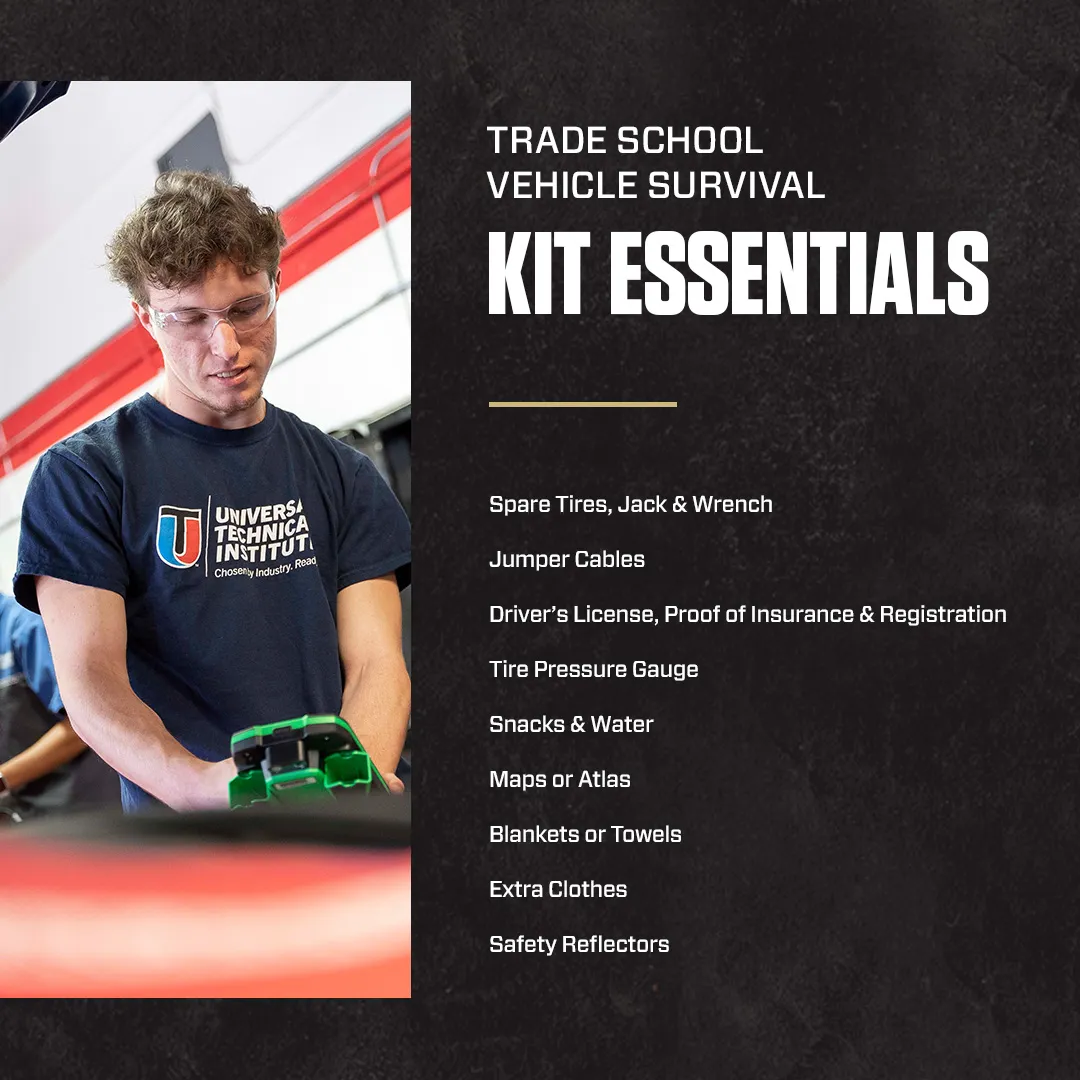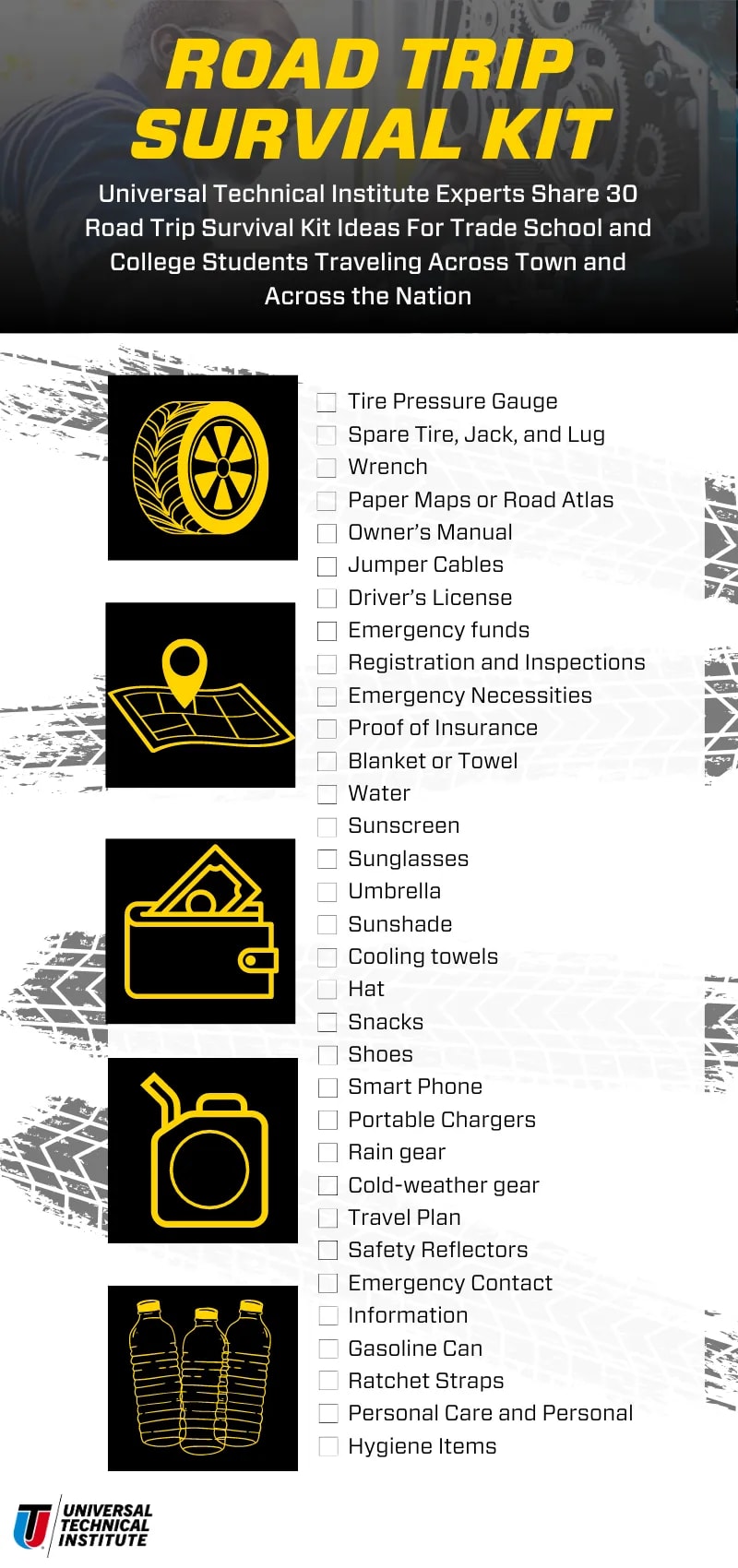Table of Contents
- Make Sure Your Car Is Ready
- The Ultimate Road Trip Checklist:
Classes are underway for trade school students, and with that comes driving to campus. Whether you’re moving across the country to attend Universal Technical Institute (UTI) or just commuting to campus from across town, it’s important to have a well-prepared vehicle to help ensure you’re ready for unexpected situations.
Keep reading for a detailed guide on the essential items that your car emergency kit should have, as well as tips for prepping your car before you hit the road.

Make Sure Your Car Is Ready
Before heading out to trade school, it’s crucial to ensure that your car is in optimal condition. Checking the condition of your vehicle can help you prevent delays, accidents or other unnecessary expenses. The time it takes to perform these checks is well spent!
Check Tire Pressure and Rotation
Making sure your tires are at the right pressure for your model is important. Underinflated tires can increase the risk of tire damage and blowouts, along with making your car less fuel efficient. Overinflated tires can also pose a problem by causing uneven tire wear and decreasing stability.
It’s also important to keep up with your tire rotations and alignment to keep your suspension system in good condition along with your tires themselves.
READ: A TECHNICIAN’S GUIDE TO TIRES
Examine Oil and Other Fluids
The oil in your car is probably the most important fluid to check before you hit the road. Low oil levels or dirty oil can cause engine damage and decreased performance.
Other fluid levels that are good to inspect include coolant to ensure your engine doesn’t become overheated, transmission fluid to keep it shifting smoothly, and brake fluid to keep those brakes performing as they should.
Perform a Battery Test
Unless you recently got your battery replaced, it’s not a bad idea to check that your battery is in good condition before you set out. After all, it’s what provides the power you need to start your vehicle.
One of the most common ways to test your battery health is by using a multimeter tool that measures voltage. You can also perform a visual inspection of the battery and try to crank the engine if you don’t have a multimeter at your disposal.
See if You Need Fuel
This might go without staying, but checking to make sure you have enough gas to get to your destination is a smart move. You’ll be able to plan a stop to fill up on the way if needed.
Test Your Lights
Ensure that your headlights, taillights, brake lights and turn signals are all working properly. After all, they’re what help make sure other drivers on the road see you and know what you’re doing!
Verify Registration & Insurance
The last thing you want if an emergency occurs is an outdated registration or insurance policy. Make renewals if needed before you take off for trade school – and keep these documents handy in the glove box of your car.
The Ultimate Road Trip Checklist:
Along with performing checks on your car before you head out, UTI experts recommend building a vehicle survival kit that will help you feel prepared if something unexpected comes up.
Our Automotive Technology program instructors have years of industry experience and knowledge, and with this have built a list of 30 road trip essentials to carry in your vehicle.
Some of these items may be more obvious, like:
- Spare tire, jack and wrench: Having a spare tire and tire-changing tools on hand can help you quickly fix a flat and get back on the road instead of waiting for a tow truck to come to your rescue.
- Jumper cables: Great to have in case your battery dies.
- Driver’s license, proof of insurance and registration: These are important to have in case of an emergency or traffic stop.
- Tire pressure gauge: Allows you to keep an eye on the pressure of your tires during your commute or road trip.
- Snacks and extra water: No road trip is complete without them – and it’s helpful to pack more than you think you need in case you end up in a delay or stuck somewhere.
Others on the list you might not have thought about – but are great to have just in case:
- Paper maps or road atlas: In this digital age, we don’t tend to think about using a paper map when we can pull up directions on our phones. But having a paper map handy can prove useful if you lose cellular service or power.
- Blankets or towels: Keeping a few blankets or towels in your car can be helpful for many reasons: Use them to stay warm, clean up spills or sit on to avoid contact with pavement.
- Extra clothes and gear: It’s a good rule of thumb to have some gear that will cover the season you’re traveling in as well as different types of weather. Umbrellas are great for shielding you from the sun and rain while extra layers are good to keep for the winter.
- Safety reflectors: Reflective vests and triangles can keep you safe and more visible to drivers if a problem occurs at night.
These are just some of the recommendations. Check out the full list below!

We also recommend telling your friends or family about your travel plans to keep them in the loop. Sharing your location is a great way to stay safe and connected on the road as you journey to UTI!
Prepare for the Road and for Your Future
Now that you know what your car survival kit should include, you’re ready to start training for a future you’re excited about!
UTI offers training programs for the skilled trades, transportation and energy fields, with 16 campus locations across the country. Whether you want to train to become an automotive technician or have an interest in wind energy, we have a program that can help you pursue your passion.*
And if attending trade school means a move is in store for you, you’re not alone. Our Housing Assistance Team is dedicated to helping you find affordable shared or individual housing near the campus you’ll be attending.
Ready to get started? Talk to an Admissions Representative about how you can enroll today by calling 1-800-834-7308 or visiting here
Universal Technical Institute of Illinois, Inc. is approved by the Division of Private Business and Vocational Schools of the Illinois Board of Higher Education.



